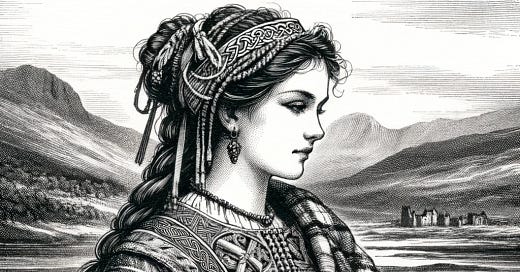The Case of Isabel Duff and Her Unique Role in Scottish History
In the tapestry of Scottish nobility, the narrative of Isabel Duff, Countess of Buchan, stands out as an evocative depiction of the powerful roles that women often played in medieval politics and society. Her life, intricately interwoven with pivotal historical moments and the volatile reigns of kings, provides a compelling study of the potent influences women wielded in shaping the course of Scottish history.
The Crown and the Cage: A Tale of Two Coronations
One of the most significant aspects of Isabel's historical footprint is her pivotal involvement in two major Scottish coronations, which showcased her deep commitment to dynastic traditions. Isabel was responsible for crowning Robert the Bruce in 1306, a role inherited from her ancestors and typically reserved for the male head of her family. However, in an era when women seldom held such visible positions of power, Isabel's participation was not just a ceremonial act but a profound statement of her political agency and allegiance.
This moment of personal bravery had severe personal repercussions. In defiance of her familial connections—particularly with John Comyn, third Earl of Buchan, who was vehemently opposed to Bruce—Isabel supported Bruce's claim to the throne. Her actions led to her capture and subsequent harsh imprisonment by the English. Isabel was held in a specially constructed cage at Berwick Castle, where she was exposed to public view and the harsh elements, enduring three years of captivity that underscored the brutal tactics often employed in medieval warfare.
A Complex Legacy: Marriages and Alliances
Isabel's life was significantly shaped by her multiple marriages, each strategically important, tying her to some of the most influential men of her time and deeply entwining her within the political fabric of Scotland. Her husbands included notable figures such as William Ramsay, Walter Stewart, Thomas Bisset, and John Dunbar. Each alliance brought its complexities and political ramifications, reflecting the intricate web of noble alliances that were pivotal in medieval Scottish power dynamics.
These marriages highlight the dual role of noblewomen as both pawns and players in the political arena, where personal relationships could decisively impact political stability and power shifts. Isabel's marriages are testimonies to the challenges and opportunities faced by women in her position—navigating alliance, kinship, and enmity within the fraught political landscape of medieval Scotland.
The Twilight of a Noble Line
Despite her active engagement in the affairs of her time, Isabel's life also marked the end of her direct lineage. Dying childless in 1389, she left her substantial lands and titles to her brother-in-law, Robert, Earl of Menteith. This bequeathment followed the medieval practice of estates passing through male relatives, reflecting the limited options for women to secure their legacies directly. After the execution of Robert's son, Murdoch, for treachery, the title and estates reverted to the Crown, illustrating the precarious nature of noble inheritances, which were often at the mercy of royal and political machinations.
Isabel Duff's Enduring Legacy
Isabel Duff, Countess of Buchan, emerges not only as a participant in Scottish history but as a formidable figure who actively shaped the events of her time. Her involvement in the coronation of King Robert the Bruce places her prominently within Scottish historical narratives, while her subsequent imprisonment highlights the stark and brutal realities faced by noblewomen who stepped beyond traditional gender roles to engage directly in the political arena.
Her story offers rich insights into the interplay of gender, nobility, and politics in medieval Scotland and serves as a powerful reminder of the complex roles women could play in the shaping of a nation's history. Isabel's legacy, characterized by both her courageous contributions and the adversities she faced, continues to fascinate and inspire, offering a nuanced perspective on the often-overlooked influence of women in medieval politics and society.





